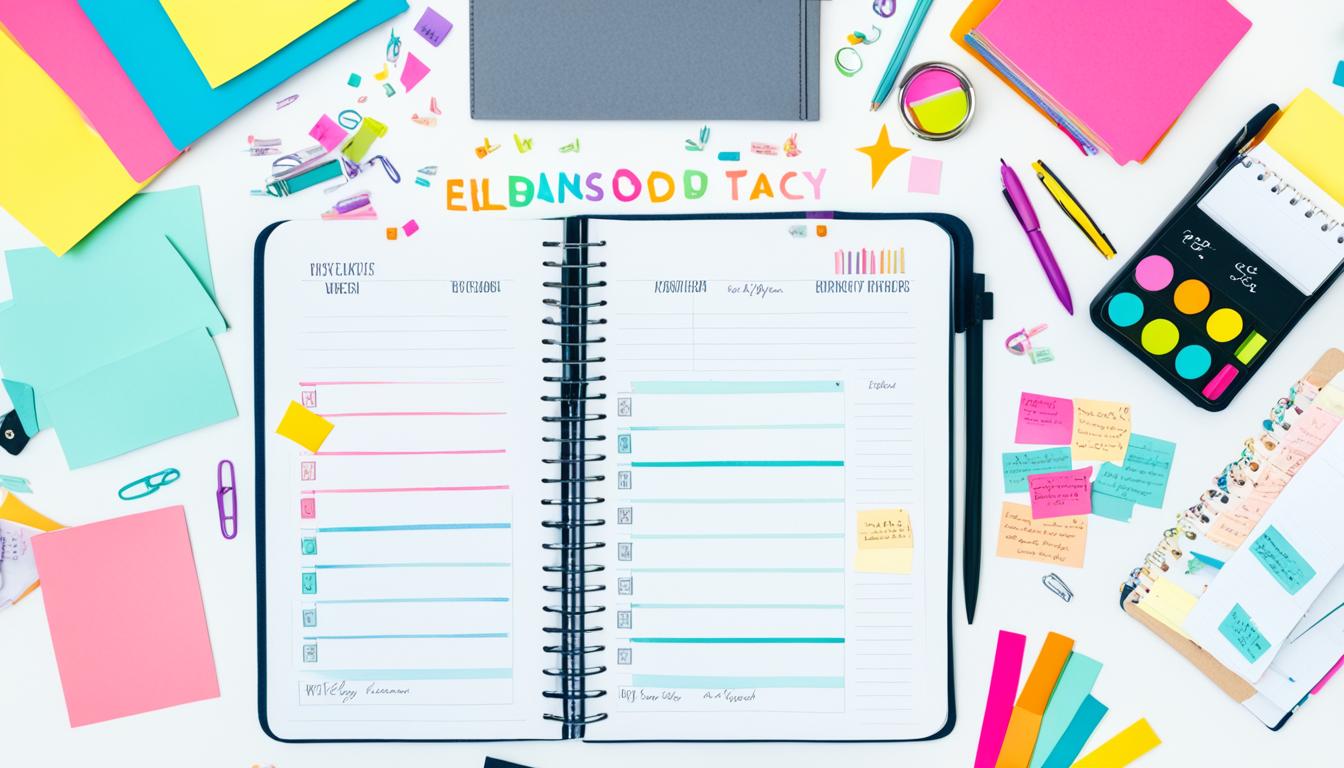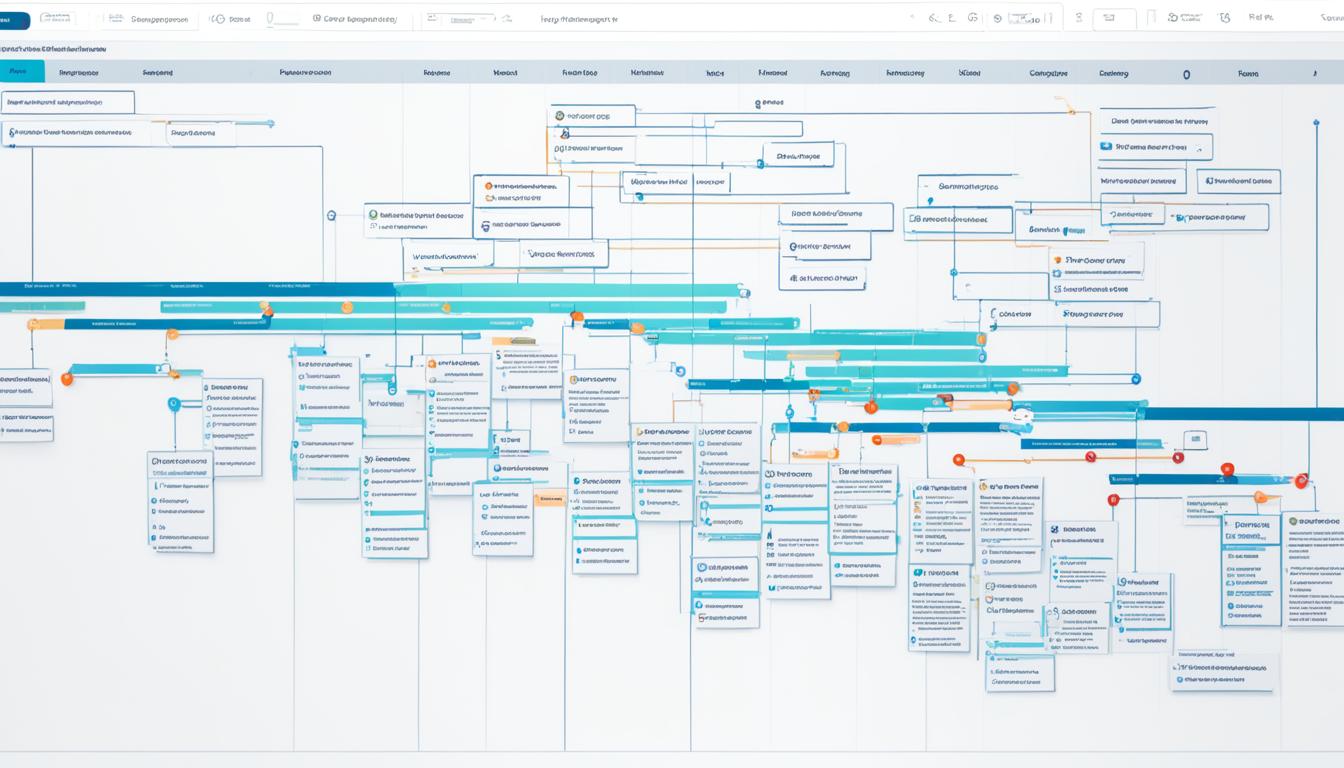Meeting deadlines is key for keeping work flowing smoothly and staying productive. Studies show that 93% of workers see meeting deadlines as vital. Also, 78% of companies think deadlines help teams work better. And, 84% of clients trust when deadlines are hit on time.
But, missing deadlines is common, often due to not focusing on what’s important, not being organized, and not talking well. To beat this, work on deadlines early, match daily tasks with big goals, and use good tracking tools. Learn from past mistakes, set clear goals, and get ready for surprises. This article shares 12 tips to help you and your team hit deadlines and reach your goals.

Key Takeaways
- 93% of employees consider meeting deadlines essential in the workplace.
- 78% of companies believe that setting deadlines improves team productivity.
- 84% of clients are reassured when deadlines are met consistently.
- Adding a buffer of 2-3 days to project deadlines can increase project completion rates by 17%.
- Dedicated focus time without distractions can increase work efficiency by 40%.
Understand Why You Miss Deadlines
Knowing why you miss deadlines is key to fixing team performance and keeping trust with stakeholders. Many things can cause missed deadlines, like bad work habits or unexpected problems.
Common Causes of Missed Deadlines
Missed deadlines come from both inside and outside issues:
- Unclear priorities cause confusion and slow work.
- Changes in project scope mess up timelines.
- Not planning well leads to unclear tasks and schedules.
- Guessing how long tasks will take causes delays and waste.
- Too many tasks and tight deadlines put pressure on the team.
- Unexpected events or crises can get in the way.
- Uncommitted stakeholders cause delays and misalignment.
The Importance of Identifying Root Problems
Finding the main problems is key to better work habits and avoiding productivity issues. This means:
- Doing a deep analysis to figure out why delays happen.
- Using a daily communication plan to keep everyone updated.
- Looking at how missed deadlines affect things to make important changes.
- Reviewing project scope and moving resources wisely.
- Keeping clear and steady communication with the team and stakeholders.
Understanding and fixing the reasons for missed deadlines helps teams do better and gain trust from stakeholders. As Adam Savage said, ”A deadline is a potent tool for problem-solving.”
Clarify Priorities
It’s key to set clear priorities to hit deadlines. Linking daily tasks to big goals makes a clear plan. This helps know what to do first. Teams should line up tasks with main goals for a smooth flow and clear path to goals.

Connecting Daily Work to Goals
Aligning goals is key for staying productive and cutting stress. Many feel most tasks are urgent and important, leading to burnout. It’s important to know which tasks are truly key. Here are some tips:
- Break Down Large Tasks: Cut big tasks into smaller parts. This makes managing work better and helps finish projects on time.
- Estimate Time and Effort: Figuring out how long tasks take helps organize priorities and make realistic daily plans. It stops overdoing it and burnout.
- Update To-Do Lists Regularly: Keep your to-do list fresh, either at day’s end or morning. This keeps track of progress and helps plan tasks well.
Creating an Eisenhower Matrix
The Eisenhower Matrix is a great tool for sorting tasks by urgency and importance. It helps in focusing and avoiding putting things off. Here’s how to use it:
CategoryDescriptionA (Do It Now)High-priority tasks that need immediate attention. These tasks are critical for meeting team deadlines and should be tackled quickly.B (Do It Soon)Important but not urgent tasks. These should be set for later but still fit with the big goals.C (Do at Leisure)Low-priority tasks that can be done at a slower pace or given to others. These tasks don’t have a pressing deadline.
Using tools like the Eisenhower Matrix and focusing on high-effort tasks first boosts task completion and productivity. This structured way of prioritizing work cuts down on stress at work. It leads to a healthier and more productive work life.
Have a System to Track Projects and Deadlines
Good project management is key to finishing tasks on time. Most organizations say less than half of their projects finish on schedule. Using a strong deadline tracking system can really boost team work and make things clear.
About 20% of workers don’t have a good way to manage their time. This makes 80% feel overwhelmed at work. A system to track deadlines helps by giving out reminders and updates in real-time. This helps teams meet deadlines and work better.
Missing deadlines can cost a lot, like refunds or overtime pay. Tools like Motion, starting at $19 a month for one person or $12 for teams, can help. Deadline Tracker starts at $15 a month for one person. For more features, BigTime starts at $20 a month.
SoftwareIndividual PlanTeam PlanSpecial FeaturesRatingsMotion$19/month$12/user/monthAutomated RemindersN/ADeadline Tracker$15/monthN/AN/AN/ABigTime$20/monthN/AAdvanced Project ManagementN/AJetpack Workflow$30/month billed annually$45–$49/user/monthSpecialized for AccountantsG2: 4.1/5, Capterra: 4.8/5ClickUpFree Forever Plan$7–$12/month/userAI support, Excellent User ExperienceG2: 4.7/5
Using these tools makes work clearer. ClickUp offers plans from free to $12 per user monthly. It’s rated 4.7/5 on G2 from over 8,000 reviews and has AI features for $5 a month.
Deadline tracking software helps teams work better by showing all tasks and their deadlines. Tools like Jetpack Workflow, starting at $30 a month, have special features for accountants. Using these tools helps teams track projects and meet deadlines, leading to success.
Ensure Deadlines Matter to the Team
Deadlines are key for the team to follow them. Start by giving context and motivation for each deadline. This makes team members more likely to set their priorities right and feel a shared urgency. About 50% of projects miss deadlines because of bad resource management.

Clear communication about project milestones keeps the team focused. It’s also important to link tasks to big project goals. Regular meetings to review progress keep the project on track.
Many employees, 47%, don’t get the project direction well, leading to missed deadlines. Good planning and management help fix this. Most missed deadlines happen when other work gets priority, showing deadlines are crucial.
Structured planning sessions with the team build support and make everyone accountable. Regular feedback makes the work culture open and helps meet deadlines. Giving personal recognition motivates the team, making deadlines important and boosting project success.
Finally, 90% of projects run late due to poor planning. Giving teams modern tools and efficient systems cuts down tech problems. This makes deadlines seen as key and reachable by everyone.
Key FactorImpactUnderstanding Project DirectionsReduces missed deadlines by 47%Effective Resource ManagementReduces deadline failures by 50%Prioritizing Work85% of missed deadlines are due to re-prioritization
Avoid Planning Fallacy
The planning fallacy is when people think tasks will take less time than they really do. This happens because we’re often too optimistic. It’s important to know about this bias to plan better and deliver projects on time.

Understanding the Planning Fallacy
We often set goals that are too high because we’re too optimistic. We don’t think about all the risks and things we don’t know. This makes planning harder. Only 30% of projects finish on time, showing how big this problem is.
Procrastination and distractions also play a part in missing deadlines. Things like emails or social media can distract us. This can make us take longer to finish tasks. Stress from tight deadlines can even make us sick.
To learn how to avoid the planning fallacy, check out this article on why we miss deadlines and how to avoid it.
Budgeting Extra Time
Adding extra time to your plans can help avoid the planning fallacy. A 20% buffer can help with unexpected delays. Doist uses four-week cycles to manage work and avoid delays. Using past data helps make better time predictions.
Talking about possible delays early can help everyone adjust plans. This way, we can handle project challenges better and plan more accurately.
Here’s a table that shows the effects and solutions for the planning fallacy:
ImpactSolutionUnderestimation of TimeUse historical data for accurate predictionsDelays and Missed DeadlinesAdd a 20% buffer to schedulesStress and Health RisksFoster a realistic time management cultureTeam Morale ImpactSet achievable goals
Being aware and planning well can help us beat the planning fallacy. This leads to better task completion and project delivery.
Understand and Manage Dependencies
Knowing what tasks need to come first is key to managing a project well. This helps avoid delays and keeps work moving smoothly. By planning ahead, teams can meet deadlines and work more efficiently.

Identifying Task Dependencies
Knowing what tasks depend on each other is vital for good project management. It helps the team know what to do first. This way, projects don’t run late because of unclear plans or bad time use.
According to the Project Management Institute, 48% of projects fail to finish on time. This is often due to unrealistic plans, unclear goals, and poor time handling. Spotting dependencies helps managers make better schedules and avoid delays caused by wrong estimates or growing project sizes.
Avoiding Bottlenecks
To stop delays, it’s important to keep an eye on progress and solve problems quickly. People usually work well for only about three hours a day. This means there’s a lot of room for missing deadlines.
Using strategies like regular checks on progress, detailed risk logs, and clear communication helps teams stay on track. Breaking tasks into smaller parts and focusing on the most important ones first can also reduce the risk of delays. This makes the workflow smoother.
Remove Distractions
It’s key to keep a workplace productive and meet deadlines. A 2018 Udemy study found 74% of Millennials and Gen Z get distracted at work. So, finding ways to cut down on distractions is vital.

Techniques to Improve Focus
Using focus techniques can really cut down on distractions. Turning on do-not-disturb on devices helps you work without interruptions. Also, staying away from gadgets during busy times helps you focus better.
Setting specific times for deep work helps too. And, using work management platforms makes everything easier to manage.
Maintaining a Disciplined Work Environment
Keeping a disciplined work area is key for being productive. Cutting down on meetings can save a lot of time for focused work. Keeping an updated calendar of projects and deadlines helps too.
By following these steps, workers can manage tasks better and avoid putting things off. This leads to more work getting done and fewer missed deadlines.
Improve Communication
Good project communication is key for clear updates and working well with stakeholders. Keeping everyone informed and on the same page helps projects succeed and finish on time.

Regular Project Updates
Regular updates keep everyone informed. Tools like Monitask give detailed info on project status and help track deadlines. Reports show that 78% of good communication stops missed deadlines in fields like farming.
This clear info lets teams make quick changes and work better together.
Setting Clear Timelines
Clear timelines help avoid missing deadlines. Praising team members who hit their deadlines motivates others. This creates a team that works well together.
Realistic schedules and allowing changes keep projects moving. Managers should lead by example, sticking to timelines. This shows the team the value of being on time and responsible.
Improving how we talk, keeping things clear, and being flexible with deadlines are key to working well with stakeholders and reaching project goals.
Prepare for Mishaps
Being ready for surprises is key to keeping projects on track. It means having a solid plan for when things go wrong. This way, teams can tackle unexpected problems and keep up with deadlines.
When deadlines are missed, it’s a chance to learn and get stronger. It’s about moving from knowing you failed to accepting it and learning from it. Talking quickly about delays helps keep trust and respect.
Having a plan to fix problems shows you’re reliable and in control. This approach helps keep the project moving smoothly.
Offering ways to lessen the effects of delays shows you care about the project’s success. Being honest and clear when talking about delays helps fix trust and keep good working relationships.
Consider these stats:
- 81% of meetings fail to start on time (Blue Jeans Network).
- 15-20% of the U.S. population is always late (ABC News).
- Not planning well leads to being late, not finishing tasks, and missing deadlines.
Being late often hurts relationships at work. So, being on time builds trust, looks professional, and makes work more productive.
Experts for this article were picked from 67 community contributions. 25 were checked to choose the best experts. This shows how important planning and choosing wisely are for meeting project goals on time.
Plan Ahead of Schedule
Planning well is key to managing your time, setting priorities, and hitting your goals. It helps you stay on track and keep your focus sharp. This part will cover setting clear goals and prioritizing tasks, which are key to planning ahead.
Setting Clear Goals
Starting with clear goals is the first step to managing your schedule well. A clear goal gives direction and purpose to your tasks. Missing deadlines can stop your career growth and harm your team’s reputation.
Regularly sharing timelines is important. Project leaders should remind everyone before deadlines to stay on track. Adding extra time in your plan helps with unexpected delays.
It’s also smart to write down what your project includes, like milestones and due dates. This keeps everyone in sync and lowers the chance of missing deadlines. The 80-20 rule, focusing on 20% of work that takes 80% of time, helps manage deadlines better.
Prioritizing Tasks
It’s crucial to focus on important tasks first. Break big tasks into smaller steps to avoid putting them off. This way, you finish projects on time.

Having a backup plan is smart too. Set aside some days for unexpected problems, like a construction delay.
Training on managing projects, talking, and handling risks can improve your planning skills. Learning to be assertive and persuasive can help you meet deadlines better.
Here’s a look at different planning methods and how well they work:
StrategyDescriptionEffectivenessSetting Clear GoalsEnsures clarity and purpose, reducing risk of missed deadlinesHighTask PrioritizationFocuses on critical tasks to avoid overcommitmentHighBuffer TimeProvides extra time to handle unexpected delaysModerateEffective CommunicationKeeps the team aligned with regular updatesHighContingency PlanningAddresses unforeseen challenges proactivelyModerate
In conclusion, clear goals and prioritizing tasks are key to planning well. Using strategies like strategic planning and training helps project managers manage their time and hit their goals.
Set Your Own Goals
Setting your own goals is key to success in both work and personal life. Using a framework like the SMART goal framework makes sure your goals are clear and reachable. This helps with growth and keeps you motivated and responsible.
Using SMART Criteria
The SMART goal framework is crucial for setting good goals. It means making sure goals are Specific, Measurable, Achievable, Relevant, and Time-bound. This method makes it clear what you want to achieve and how to measure success.
According to the American Society of Training and Development, individuals pursuing their goals with accountability partners have an average success rate of 95%.
Creating a Strong Work Vision
Having a clear work vision means linking daily tasks with big goals. Visualizing the outcome is key to staying focused on what you want to achieve. It makes you more committed and boosts your productivity.
Sharing goals with others can really help you succeed. When you’re accountable to someone else, you’re more likely to stay on track. This approach helps you avoid putting things off and keeps you moving forward.
Conclusion
Meeting deadlines well needs a mix of steps. It’s about fixing delays, setting priorities, and avoiding mistakes. You should handle tasks, keep away from distractions, talk well, get ready for surprises, and set clear goals to help your projects succeed.
Stats show that copywriters often miss their deadlines. So, it’s key to have strategies at work that make you professional and accountable.
Using these strategies can make your projects better and make you known as reliable and efficient at work. For instance, good time management and realistic deadlines can reduce stress and boost productivity. Also, talking about delays and problems early can stop projects from failing and help everyone work together better.
By using these methods, you can handle project management better. The author has never missed a deadline in 30 years, showing how important these practices are. Meeting deadlines builds trust with clients and leads to success worldwide. In the end, always meeting deadlines is key to being successful at work and is a big part of good work strategies.
FAQ
What are the common causes of missed deadlines?
Missed deadlines often come from unclear priorities and changing project goals. They also stem from poor planning and wrong task size guesses. Other causes include too many tasks, unrealistic deadlines, unexpected problems, and not enough commitment from everyone involved.
Why is it important to identify the root problems of missed deadlines?
Finding the root problems helps us fix the real issues. This way, we can avoid future problems. It also makes the team work better and builds trust with everyone who cares about the project.
How can I clarify my priorities to improve my time management?
Start by linking your daily tasks to your big goals. Use tools like the Eisenhower Matrix to sort tasks by how urgent and important they are.
What is the benefit of having a system to track projects and deadlines?
A system to track projects gives a clear view of what needs to be done and when. It helps the team work better and understand the steps needed to finish tasks.
How can we ensure deadlines matter to the entire team?
Share the reason behind each deadline to make everyone understand its importance. Avoid setting deadlines without a clear purpose. This builds a sense of urgency and helps the team stick to the schedule.
What is the planning fallacy and how can it affect deadlines?
The planning fallacy is when people think a task will take less time than it actually will. This can lead to deadlines that are too tight and cause delays in finishing projects.
How can we manage task dependencies to avoid bottlenecks?
Know what tasks depend on each other and plan them out. This way, work moves smoothly and avoids delays.
What techniques can improve focus and minimize distractions?
Use do-not-disturb modes and separate yourself from your devices. Set specific times for deep work. Also, use tools that help you manage your work better.
How does effective communication impact project deadlines?
Keeping everyone updated and setting clear deadlines makes things clear. It allows for changes early on and helps everyone work together better. This keeps the project on track.
What is contingency planning and why is it important?
Contingency planning means getting ready for problems by thinking about what could go wrong. It helps you handle unexpected issues and keep your project on schedule.
How does setting clear goals help in meeting deadlines?
Clear goals keep you focused on what’s most important and stop delays. They help you manage your time well and reach your project goals.
What is the SMART criteria for goal-setting?
SMART means Specific, Measurable, Achievable, Relevant, and Time-bound. Using this helps set goals that are clear and can be reached. It helps with planning and seeing what you want to achieve.

More Posts
Top 10 Reasons for Low Employee Engagement
Employee engagement is key for a business to do well. When employees are engaged and motivated, they work better and help the company make more money. But, many companies struggle with employees who...
Top 7 Success Tips Solopreneurs Must Know to Get Started
Life of a solo entrepreneur, also known as a solopreneur, can be quite overwhelming at times. It’s not just about the money, given the fact that investment is one of the greatest commodities...
Compound Effect: 8 Lessons to Deal with Procrastination
Procrastination is a big problem, but Darren Hardy's "The Compound Effect" helps a lot. This book is great for those wanting to grow personally and succeed. It teaches us to take small, steady...
Key Benefits of a Task Management Software
Is your organization a victim of inefficient task execution? Is your team constantly missing deadlines? If so, you may need to think about implementing task management software. The software is essential because it...